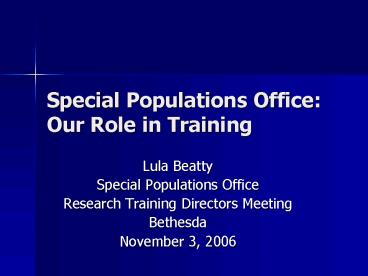Special Populations Office: Our Role in Training - PowerPoint PPT Presentation
1 / 24
Title:
Special Populations Office: Our Role in Training
Description:
Seminar Series. Mentoring provided by staff and extramural scientists ... Half of T32 minority postdocs reported having no mentor ... – PowerPoint PPT presentation
Number of Views:21
Avg rating:3.0/5.0
Title: Special Populations Office: Our Role in Training
1
Special Populations Office Our Role in Training
- Lula Beatty
- Special Populations Office
- Research Training Directors Meeting
- Bethesda
- November 3, 2006
2
Objectives
- Discuss the purpose of the Special Populations
Office - Describe research development and training
programs of the office - Identify possible mutual concerns and interests
3
SPOs Vision and Goals
- The SPO strives to increase and improve the
quality of the knowledge base on understanding,
preventing and treating drug abuse and addiction
particularly as drug use affects racial/ethnic
minority and other health disparity populations.
Goals include
4
SPOs Vision and Goals
- Preparing researchers to better address minority
health disparities - Stimulating/Encouraging research that will lead
to more effective drug abuse and drug abuse
related prevention and treatment approaches for
racial/ethnic minority populations - Increasing the number of racial/ethnic minority
researchers engaged in drug abuse and related
research
5
Increasing the Number of Racial/Ethnic Minority
Researchers
- Diversity (Minority) Supplement Program
- Summer Research with NIDA
- Research Development Seminar Series
- Expert Racial/Ethnic Minority Work Groups
- National Hispanic Science Network
- Historically Black Colleges and Universities
(HBCU) Initiative - Minority Institutions Drug Abuse Research Program
(MIDARP) - Southern Africa Initiative
6
Diversity (Minority) Supplement Program
- NIH-wide program
- Supplement to NIDA grantees
- Mentoring/Training for an identified individual
from underrepresented or disadvantaged
population includes support for persons with
disabilities - Certain mechanisms cannot be supplemented, e.g.,
Ts
7
Diversity (Minority) Supplement Awards New
Continuing FY 1994 FY 2005
8
New Minority Supplement Awards FY 1994 FY
2004 Gender, Level of Support Ethnicity
M Male F Female HS High School NA
Native American U Undergraduate PI Pacific
Islander Pre Predoctoral Post Postdoctoral I
Investigator
9
Summer Research with NIDA
- Summer program for undergraduates and high school
students from racial/ethnic minority groups - 8-10 week research placement with NIDA
investigator - Off-shoot of Diversity Supplement program
10
Summer Research with NIDA Program
FY 1997 FY 2005
11
Number of Summer Sites by Year
12
Minority Recruitment and Training Program (IRP)
- Summer program for persons in high school through
college some faculty support - About 25 students participate each summer
- Partnered with an IRP scientist
13
Seminar Series
- Technical assistance program established in 1980s
for underrepresented scientists who are ready to
apply for independent awards - Must have written concept
- Provides science and proposal development
lectures, small group discussion, and one-on-one
mentoring in two-session seminars (about 6 months
apart)
14
Seminar Series
- Mentoring provided by staff and extramural
scientists - Second session centers on mock review led by NIDA
SRA - Expectation is that application will be submitted
within 6 12 months after last session
15
Seminar Series Outcomes
- In early years, success rate reported at over 80
- A number of participants have become NIDA and
other NIH grantees
16
Selected Co-sponsored Programs
- Physician Scientist Program (NCMHD)
- Longitudinal research development program for
racial/ethnic minority students (starting at 7th
grade) - High school students placed in NIDA IRP during
summer - Clinical Research Education and Career
Development in Minority Institutions (NCRR) - Specialized Neuroscience Research Program (NINDS)
- Minority Fellowship Programs (to professional
associations) - Native American Research Centers of Health
(Indian Health Service) - Summer Program at Harvard for Native American
students - (with NIMH and others)
- Summer internships, e.g., HACU, NAFEO, WIN
17
Assessment of NIH Minority Research and Training
Programs
- National Academy of Sciences study to
- Assess how well these NIH minority research
training programs work - Identify characteristics of successful programs,
trainees and institutions - Recommend strategies to render future assessments
feasible - Provide recommendations for a coordinated trainee
tracking information system
18
Difficulties Experienced
- Inadequate trainee tracking data
- Available data are not readily accessible
- Prohibition against accessing or viewing
individual trainee race and gender data - Lack of coordination among NIH minority research
training IC representatives
19
Conclusions
- Underrepresented minorities are entering the
biomedical workforce as a direct result of the
NIH minority research training programs - Best feature is the research experience itself
- Financial support was another best feature,
though needs to be increased - Other positive features were opportunities to
network and collaborate, prepare grant proposal
20
Conclusions
- Mentoring needs to be improved (e.g., mundane
administrative tasks) - Half of T32 minority postdocs reported having no
mentor - Drop off of females at postdoc/junior faculty
level - Look beyond training the individual fellow to
effect long-term change
21
Common Concerns
- Meeting our expectations for inclusion of
students from racial/ethnic population groups - Evaluating effectiveness
- Tracking students and participants
- Ensuring that participants receive excellent
mentoring, opportunities, and support - Ensuring that grantees (mentors) feel supported
and appreciated
22
Can We Help You?
- Share names of students in our programs
interested in pre and post doctoral support - Share mentoring experiences, concerns and
successes - Know requirements of our Diversity Supplement
program so that you can use it with R or other
awards
23
Will you help us?
- How can we show support for/appreciation of
mentors - Participate in our Seminar Series and other
meetings as faculty/mentors
24
Contact Us301-443-0441http//www.nida.nih.gov/ab
out/organization/SPO/SPOHome.html
- Pamela Goodlow Diversity Supplement and Seminar
Series - Flair Lindsey Summer Research with NIDA
- Ana Anders National Hispanic Science Network
- Derrick Prather Work Groups and Southern Africa































